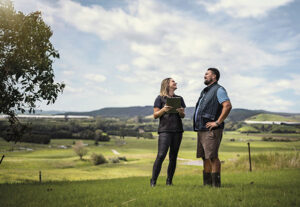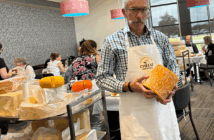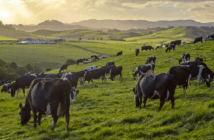
BY NZFT FEATURES WRITER RACHEL MACDONALD
Charlotte Rutherford has been a champion for rural sustainability in this country for more than 20 years. Today, she is Fonterra’s director of sustainability, leading the design and implementation of many of the co-op’s environmental and research programmes. Her role has recently become more complex. Why?
New Zealand is one of the first countries to make climate-related disclosures mandatory, with many others following suit. The disclosure regime will require climate reporting entities to start making public climate-related disclosures for their financial years from on or after January 1, 2023, in accordance with climate standards published by the External Reporting Board (XRB). The Financial Markets Authority will be responsible for monitoring regulation, and enforcement. Rutherford explains that Fonterra has decided to adopt these guidelines a year early to help prepare the co-op for the forthcoming mandatory disclosure.
“Two hundred publicly listed companies are going to be required to release a climate-related disclosure next year, so we decided to try a trial run ahead of the compulsory introduction of these new measures,” says Rutherford. “The idea is that this will give us a head start on positioning Fonterra’s climate-related activities across our value chain in line with the standards and allow us to engage early with our farmers and stakeholders on climate-related risks and opportunities.”
THE TRIDENT
Rutherford has spent 21 years at Fonterra, working for the co-op in the fields of environmental resilience and sustainability.
“To begin with, my interest was very local and environmental. However, society has since required a much broader approach. Now, at Fonterra, we have whole teams focusing on it, and we get judged on our success and what it’s going to mean for our future,” she says.
She says Fonterra has a three-pronged long-term strategy, which includes positioning the co-op as a leader in sustainability. Among its sustainability initiatives is an investment of $1billion to reduce its manufacturing emissions as it moves towards zero coal and improving the quality of its waste water.
“Climate and water are two important components of our sustainability work. Another important issue we need to consider over the next six months is the increasing emphasis on nature and biodiversity,” says Rutherford. “In addition to consulting our stakeholders to help validate our thinking, all of this needs to be assessed, discussed and reviewed by our Sustainability Advisory Panel, a group of ‘friendly critics’. They hold us to account and identify some of the big questions that we may have missed.”
To be fair, she says, you could pick anything as a priority – water quality, animal wellbeing, sustainable value.
“Climate change is a huge and complex issue, and it is constantly evolving. It’s about identifying the why, what and how of what we can do to address this, particularly since we are in a leading position to do so and already stack up well in our efforts. That said, it takes a lot of constant work to retain that position,” she says. “However, first and foremost, a sustainable co-op wields massive weight in terms of our farmers and the value they can leverage both here and overseas. Supporting our shareholders on their sustainability journey will help keep them strong now and into the future.”
LOOKING AHEAD
A major part of the strategy is focused on building inter-generational resilience, she says.
“As a co-op, we’ve been here for generations – and we want to stay here. One of the big changes we have to cater for now is the acceleration to meet the requirements of our customers. They want every detail in terms of climate effects in particular. There’s no room for greenwashing in this game; transparency of intent is vital.”
The strategy long-term has been to deliver change through change management.
“Ten or 15 years ago, Fonterra realised the need for advice and support for farmers, which led the co-op to assume a role as the largest environmental consultancy in the country,” says Rutherford. “It’s about supporting our farmer owners and making sure our guidance is practical and relevant on-site. The co-op is made up of 9000 farming families who we work in partnership with and we are committed to creating value from the goodness of New Zealand milk, now and into the future. That remains essential as we try to move the whole environmental curve forwards.”
She says it’s been a case of having a forward-looking framework in place and being able to demonstrate that this is no one-trick pony in terms of business resilience and the environment.
“It’s hard work, it’s ongoing, and it feeds into all aspects of farm management. We also realise that some farmers are struggling with change fatigue and they have to be supported through that.”
However, she says Fonterra’s farmer owners are generally up for the challenge. They want to leave their land better than they found it, but need to know how much that will cost and how to recoup their investment.
“Our owners also have a massive manufacturing asset that we manage on their behalf and they expect it to be managed sustainably.”
She says that her role as a caretaker for inter-generational resilience will never be done. Sustainability, she says, will be an ongoing journey for the co-op.
“Our long-term sustainability ambitions and commitments that we made towards 2030 – a 50% absolute reduction in Scope 1&2 emissions from a 2018 baseline – are tracking well.”
The next issue to be addressed, she says, is likely to be sustainable packaging, which requires ongoing investment in research and development.
“The question of packaging comes up a lot in our surveys, so we’ll be taking a long, hard look at it. It’s a very tangible factor and one that’s important to our consumers locally and internationally.”




























































































